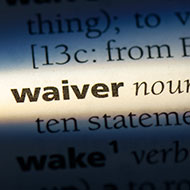New measures to help vets spread renewal fee cost

The RCVS has announced that it will be waiving late payment fees.
In light of the continuing COVID-19 coronavirus pandemic, the RCVS is introducing new measures to help veterinary surgeons spread the cost of their annual renewal fees. It also announced that it will be waiving late payment fees.
The new policy, which applies to UK-practising members only, will allow those who would prefer not to – or are currently unable to pay their annual renewal fee in full - to spread the cost over three instalments: paying 50 per cent of the fee by 30 April, 25 per cent by September and the remaining 25 per cent by 31 December.
“We recognise that most veterinary businesses will be seeing a downtown during the coronavirus (COVID-19) lockdown, especially as veterinary practices reduce their workloads to emergency-only procedures or those that can be classed as urgent,” explained RCVS treasurer Dr Kit Sturgess. “Furthermore, we understand that many individual veterinary surgeons will no longer be working, and that this will cause financial difficulties for many vets and their families.
“We appreciate that this is a very difficult time for the profession, and as part of our compassionate approach to regulation we wanted to do our bit to help people manage the difficult financial consequences of the coronavirus crisis, and to help them to return to work as soon as Government advice allows.”
Fees for veterinary nurses are not due until the end of the year, but the RCVS said that it will be reviewing the impact of the coronavirus pandemic “on an ongoing basis”. The policy only applies to UK-practising members as this is the group for which the ability to work as a veterinary surgeon in the UK is contingent on being a member of the RCVS.
Any UK-practising member wishing to switch to the payment-by-instalments system should cancel their existing Direct Debits immediately. The College has already temporarily deferred these direct debits for around 10-14 days to allow time for them to be cancelled.
Further details about the policy are available on the RCVS website.



 The Veterinary Medicines Directorate (VMD) is inviting applications from veterinary students to attend a one-week extramural studies (EMS) placement in July 2026.
The Veterinary Medicines Directorate (VMD) is inviting applications from veterinary students to attend a one-week extramural studies (EMS) placement in July 2026.